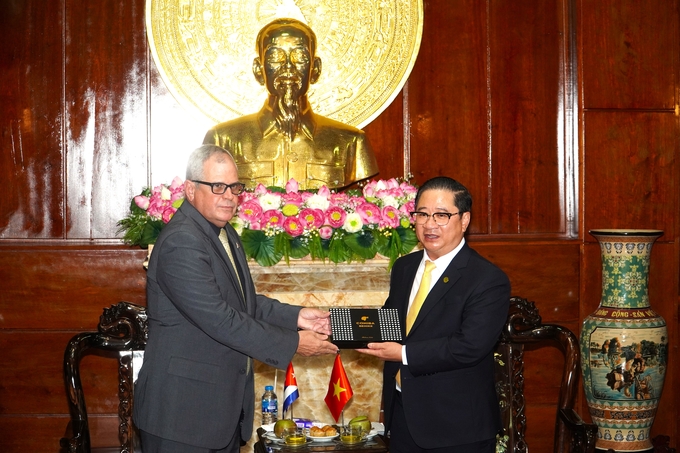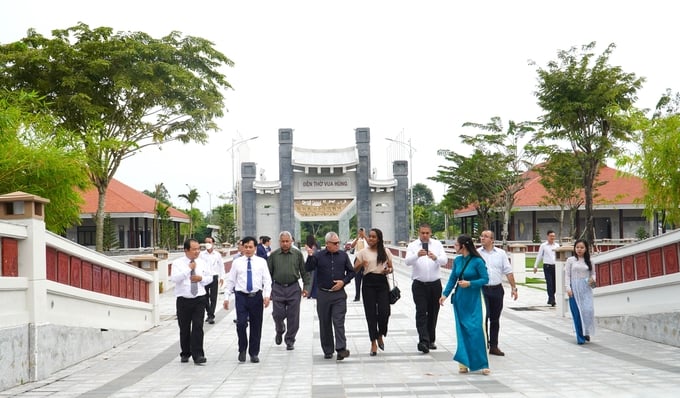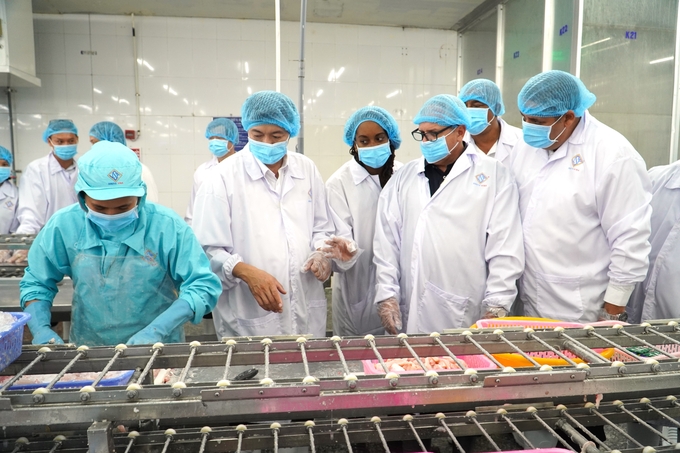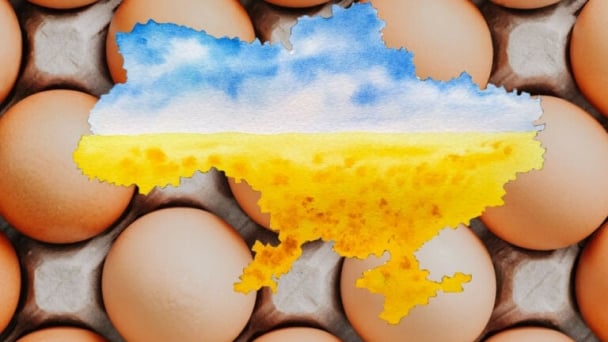May 21, 2025 | 04:24 GMT +7
May 21, 2025 | 04:24 GMT +7
Hotline: 0913.378.918
May 21, 2025 | 04:24 GMT +7
Hotline: 0913.378.918
Cuba is considered one of the potential markets for Vietnam in Central America. In recent years, two-way trade turnover between Vietnam and Cuba has reached between $250-350 million/per year. Vietnamese businesses export a variety of goods to Cuba, such as electrical appliances, electronics, clothing, shoes, cosmetics, construction materials, industrial materials, household appliances, stationery, food… In particular, Cuba is also a stable rice import market of Vietnam.

Mr. Tran Viet Truong, Chairman of Can Tho City People's Committee welcomed Mr. Homero Acosta Álvarez, Secretary General of the National Assembly and the Council of State of Cuba. Photo: Kim Anh.
The Vietnam - Cuba Trade Agreement was made in April 2020, a trade agreement that Cuba signed for the first time with an Asian country. This has opened up opportunities to promote trade relations between the two countries. Moreover, this is an important basis for businesses of the two countries to take advantage of tariff preferences and use the Cuban market as a focal point to pave the way to export Vietnamese goods to neighboring regions and Latin American countries. Vietnam and Cuba aim towards raising the two-way trade turnover to $500 million in the next 5 years.
Recently, the delegation of the National Assembly and the State Council of Cuba visited and worked in Can Tho city. This visit once again tightens the good economic and friendly relations between the two countries in general and between Can Tho City and the Consulate General of the Republic of Cuba in Ho Chi Minh City in particular.
According to Mr. Tran Viet Truong, Chairman of Can Tho City People's Committee, in 2023, the city will implement several projects from central investment. These include the Center for the association, production and consumption of agro-products in the Mekong Delta in Can Tho city; The project of dredging to clear Dinh An channel ensures that high-load ships can enter and exit, facilitating the transportation of goods; barges of agro-products from Can Tho City and the Mekong Delta provinces to the region and the world. Thereby, the Chairman of Can Tho City People's Committee hoped that Cuba would promote and introduce the potential and investment opportunities of Can Tho city to associations and investors in Cuba.

The delegation of the National Assembly and the State Council of Cuba visited the Temple of the Hùng Kings, Can Tho City. Photo: Kim Anh.
In addition, in order to promote the cooperation relationship between Can Tho City and Cuba in the coming time, Mr. Tran Viet Truong suggested that the two sides should continue to strengthen and organize working delegations and trade promotion. Moreover, Can Tho City and Cuba need to create conditions for businesses of the two sides to contact, exchange, and research the needs, advantages, and actual capacity of each side to move towards trade and investment cooperation projects in the near future.
On this occasion, the delegation led by Mr. Homero Acosta Álvarez, Member of the Party Central Committee, Secretary General of the National Assembly and Cuban State Council visited and learned about production and business activities at Southern Seafood Industry Co., Ltd. An business specializing in processing and exporting catfish and seafood in Can Tho City.

The Cuban National Assembly and State Council delegation learned about pangasius processing activities at Southern Seafood Industry Co., Ltd., Can Tho City. Photo: Kim Anh.
The delegation learned about the process of raising and processing pangasius to create raw materials, a processing process that serves the export market of the Company. The Cuban delegation also paid special attention to the contribution of businesses to the locality as well as to the social community.
Mr. Tran Van Quang, General Director of the Company said, the Company has 15 years of experience in manufacturing to serve export needs. Revenue from export brings about $60 million/year on average. Since then, each year this business contributes about 20% of profits to the local budget.
Vietnam - Cuba Trade Agreement, with 14 chapters, includes provisions on trade in goods, rules of origin, customs management and trade facilitation, trade remedies, standards, technical regulations, and conformity assessment procedures. It also includes measures for food hygiene and safety and animal and plant quarantine, economic and trade cooperation,...
Accordingly, the two sides committed to eliminating or cutting taxes on nearly 100% of goods being imported from each other's markets within 5 years. Many of Vietnam's key products including rice, grains, seafood, flowers, beans, construction materials, textiles, electrical appliances, medical equipment, and protective... enjoy preferential tax rates. In addition, fresh vegetables and fruits, confectionery, cooking spices, cosmetics, machinery, automation equipment, and products from rattan and bamboo... will enjoy a tax rate of 0%.
Translated by Hoang Duy

(VAN) Oliyar, a prominent Ukrainian oil and fat manufacturer, has revealed plans to build a farm for 2.3 million laying hens in the Lviv region. The additional production quantities promise to change the competitive landscape of the egg market of the Eastern Europe region.

(VAN) On May 15, Ministry of Agriculture and Environment of Vietnam hosted the 'Connecting Vietnam - Germany agricultural, forestry and fishery trade' seminar in Berlin, Germany.

(VAN) In the face of counterfeit and imitation products, Khanh Hoa Salanganes Nest Company hopes for the prompt completion of the legal framework, strict enforcement against violations, and protection of the bird’s nest brand.

(VAN) Japan's efforts to lower the price of rice through the release of its stockpile may finally be making some progress, albeit at a snail's pace.

(VAN) U.S. tariffs are not only a 'shock', but also an opportunity for Vietnamese businesses to renew their mindset toward comprehensive development.

(VAN) As Bac Giang lychee enters the harvest season, Minister Do Duc Duy expects that the fruit will contribute greatly to agricultural exports due to standardized production and deep processing.

(VAN) Consumers have shown a preference for free-range eggs, but those farming systems are more vulnerable to biosecurity risks like bird flu.